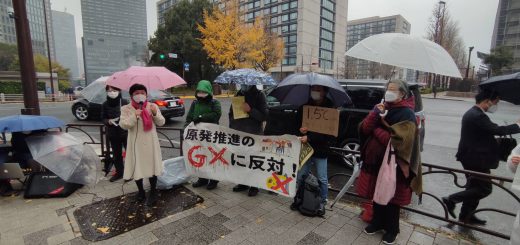News Watch
GX Promotion Bill, GX Decarbonized Power Supply Bill Passed
Two GX- (Green Transformation) related bills Japan’s government had submitted to the Diet overcame much opposition to be passed.
The GX Promotion Act (Act for the Promotion of a Smooth Transition to a Decarbonized Growth-oriented Economic Structure) was passed by the House of Representatives on March 30 and after a revised version was passed by the House of Councilors on April 28, it was resubmitted and passed by the House of Representatives again on May 11. Stating that it will be necessary to invest 150 trillion yen in decarbonization over the next ten years, Japan’s government will provide about 20 trillion yen. The funding for that will include things like government issuance of new “GX transition bonds.” Of that amount, about one trillion yen is expected to be invested in demonstration reactors including high-temperature gas-cooled and fast reactors. New budgetary items already appearing in the current fiscal year include 7.6 billion yen for a project to develop a fast demonstration reactor and 4.8 billion yen for a project to develop a high-temperature gas-cooled demonstration reactor as “GX support measure costs.” The total costs of these two projects for the three years up to FY2025 are to be 46 billion yen and 43.1 billion yen, respectively.
The GX Decarbonized Power Supply Bill (Bill for Partial Revision of the Electricity Business Act, etc. for Establishing an Electricity Supply System toward the Realization of a Decarbonized Society) is a bundled bill amalgamating five reform bills affecting the Atomic Energy Act, Nuclear Reactor Regulation Act, Electric Utilities Industry Act, Spent Nuclear Fuel Reprocessing Act and Act on Special Measures Concerning Procurement of Renewable Electric Energy by Operators of Electric Utilities. It was passed by the House of Representatives on April 27 and was passed by the House of Councilors on May 31. Problems with it have been described in detail in CNIC’s Statements on April 28, “GX Nuclear Power Plant Bill Passed by Japanese House of Representatives After Diet Deliberations Full of Deceit and Fabrication” and May 31, “Japan’s Upper House of the Diet throws out the lessons of Fukushima.”
Contract with UK Company for Monju’s Sodium Processing
JAEA signed a “Framework Contract on Processing in the UK” on April 28 with Cavendish Nuclear Limited regarding the processing of sodium coolant as a part of decommissioning the Monju prototype fast breeder reactor. In this agreement on a basic framework on items such as preparing facilities to be used for sodium processing and then processing the sodium, the actual work will be conducted by a joint venture to be set up between Cavendish Nuclear Limited and Jacobs Clean Energy Limited. The target for processing is retrievable sodium in Monju’s primary and secondary systems, and the work is planned to take about ten years.
The main items in the contract are as follows:
(1) An outline of the overall work process
(2) A framework for several individual contracts, including for drafting plans for the sodium processing facilities, preparation of the facilities, processing the sodium and dismantling the facilities
(3) General conditions common to all of the individual contracts (division of responsibilities, confidentiality, etc.)
The individual contracts are to be concluded as work progresses, with the first being for drafting plans for the sodium-processing facilities, which is expected to be concluded in 2023.
Joint Statement on Stronger Japan-France Nuclear Energy Cooperation
Japanese Minister of Economy, Trade and Industry Nishimura Yasutoshi visited eight nations in Europe between April 29 and May 8, signing a total of four joint statements and memoranda on energy.
On May 3, in Paris, he and Ms. Agnès Pannier-Runacher, French Minister of Energy Transition, signed a Joint Statement on Nuclear Energy Cooperation which reads as follows:
“With this statement, our two countries commit to deepen mutual nuclear cooperation with a strong focus on R&D. In particular, France and Japan agreed to accelerate exchanges, including support for R&D on:
- safe long-term operation and safety improvement of existing nuclear reactors,
- steady and efficient decommissioning of nuclear power plants, including enhancing industrial cooperations for the decommissioning of Fukushima Daiichi Nuclear Power Station,
- the improvement of nuclear energy capacity building in embarking countries,
- the promotion of the reprocessing policy that minimizes waste and reduces the need for natural uranium
- next-generation advanced reactors, especially on Sodium-cooled Fast Reactor (SFR).”
In Iceland, Nishimura signed a joint statement on geothermal energy cooperation, and in the Czech Republic and Poland he exchanged memoranda on cooperation in the field of nuclear energy and cooperation in developing a hydrogen supply chain, respectively.
Application Filed for Approval of 60-Year Operation of Takahama Units 3 and 4
Kansai Electric Power Co. (Kanden) filed an application with Japan’s Nuclear Regulation Authority on April 25, seeking approval for extending the operating period of the Takahama Unit 3 and 4 reactors (PWR, 870 MW each, with an operating period starting from 1985) from the original 40 years to 60 years. These are the reactors for which, one day earlier, Fukui Prefecture had given approval for the replacement of six steam generators, orders for which Mitsubishi Heavy Industries received on April 26. The cost of these orders has not been made public.
Inspection of Tsuruga Unit 2 Suspended Again
Due to issues such as rewritten data and multiple misrepresentations in the application for approval under the new regulatory standards for the Tsuruga Unit 2 reactor (BWR, 1,160 MW), the NRA conducted administrative guidance on April 18, requesting Japan Atomic Power Co. to correct their application by the end of August. The inspection of this nuclear power plant (NPP) was suspended in August 2021 (see NIT No. 204 News Watch). It had just been resumed in December 2022 after a hiatus of about two years, and a mere four months later it was suspended a second time—an extraordinary state of affairs.

